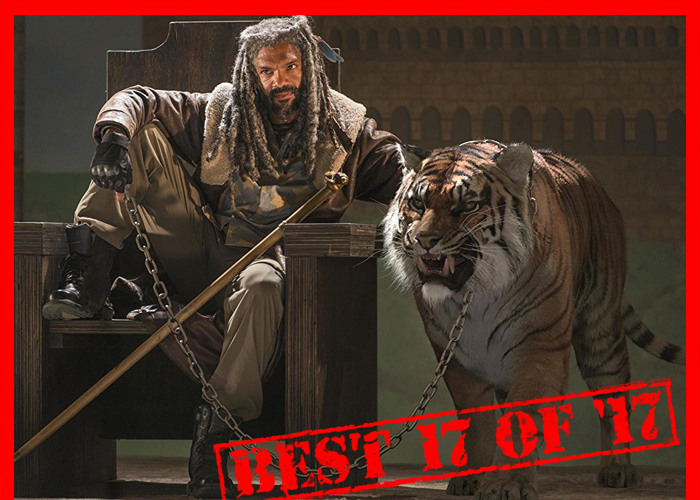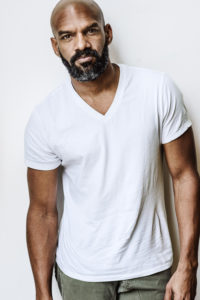
*This feature originally ran 11/17/17.
So often we hear about “the look” of those who work in film and television, but it’s their impact – an ability to draw the viewer in and take them on a journey – that should receive the “the” attention. One of those individuals with an exceptional impact is Khary Payton.
It came as a great surprise to us that the Georgia native has starred in, thus far, only nine episodes of “The Walking Dead.” As King Ezekiel, the spirited leader of The Kingdom, his character’s reach seems to have extended well beyond that which he has physically appeared, moving the fandom in ways that make a single digit episode count seem improbable. Yes, the character is noteworthy to “The Walking Dead” universe, but Payton’s performance is what makes the royal thespian memorable. It’s his “the impact” that makes an impact.
We recently sat down with Payton to discuss how he approached the character’s public persona, how voice acting played a pivotal role in establishing Ezekiel’s private persona, and why he feels like a proud papa when it comes to Cyborg, a character he has been voicing for nearly two decades.
TrunkSpace: One of the things that shocked us as we prepared for this interview is that you have only physically appeared in nine episodes of “The Walking Dead” thus far, but what you bring to the series seems to have existed for 90 episodes. That says something about your impact on not only the series but the fandom because you have really left your mark on “The Walking Dead” world in a very short period of time.
Payton: You know, I feel really a part of the production as well, and I feel invested with the cast and the crew. I think it’s just a testament to the way that this show is run and the people around it. It also helps that they give you a kingdom and a tiger. (Laughter) I’ve been lucky enough that they’ve taken a couple of episodes out to really focus on our community, so I think that helps to kind of cement ourselves into the fabric of the show. But yeah, people ask, “How do I feel about 100 episodes?” but I’m like, “I’m barely reaching double digits at this point.” (Laughter)
TrunkSpace: As King Ezekiel, you’re playing a character who himself is playing a character. Do you view both King Ezekiel, who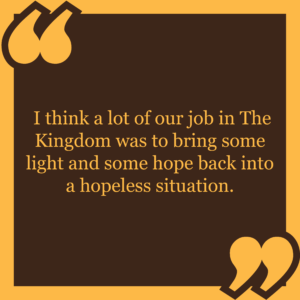 the people of The Kingdom know, and Ezekiel, the more vulnerable man he shared with Carol, as the same character? Are you playing two different people?
the people of The Kingdom know, and Ezekiel, the more vulnerable man he shared with Carol, as the same character? Are you playing two different people?
Payton: No. I was viewing it as a guy who has a job to do and you don’t act the same way in your living room as you do in your work a lot of times. It just so happens that this guy has to bring his work home a lot more than most. (Laughter) It’s kind of two sides of the same person. I think of it like… a public figure has a certain way of dealing with the public versus how they are when they’re more relaxed. With Ezekiel, it just so happens to be that his work persona has started to infiltrate to his more relaxed state because he really doesn’t have much time to relax. And I took a little bit of a cue from Lennie James and Andy Lincoln on the show. They’re British, but they kind of stay in their accent the entire time that they’re on set, and sometimes it takes them awhile to turn it off. I feel like I’m using the same kind of device with Ezekiel, that he’s talking that way so often and so much, that to turn it off, he needs kind of a conscious switch to tell himself to turn it back on or off. So it’s not something that he falls out of so easily.
People say, “I can’t believe he stayed in character through all of that.” The thing is, once you’re in character, it’s kind of hard to fall out of it.
TrunkSpace: So much of King Ezekiel’s persona is about theatrics and appearing larger than life. When it came to those tender moments where he discussed his past with Carol, what is a more subtle choice you made with the character that you’re particularly proud of?
Payton: Oh gosh. What I’m most proud of I think, especially in that first moment with Carol in the garden, was that there was no mention in the script or even in the comic about his voice changing. It was just that his physicality changed, that he was holding himself like a regular guy instead of a king or like royalty. When I first read it, the first thing I thought was that his voice had to change. I had done all of this voiceover and all of this Shakespeare over the last 20 years and I just think that’s where my mind and my heart went, in that where you really feel the difference is vocally with him. I felt really good about that.
TrunkSpace: It’s so interesting to hear your perspective on that because when you listen to that change happen in the character, it really brings the walls down, and as a viewer, you’re instantly drawn to him, much in the same way that Carol is.
Payton: Yeah. There was this slight thing I did in that talk with Carol. I said, “People see a guy with a tiger…” and I meant to say “shit,” but I just said “shoot.” I added that because I felt the vocal quality changed kind of subtly at that point, because he’s kind of quiet about it, and so I think that “shoot” was the moment that people really heard that his voice had changed.
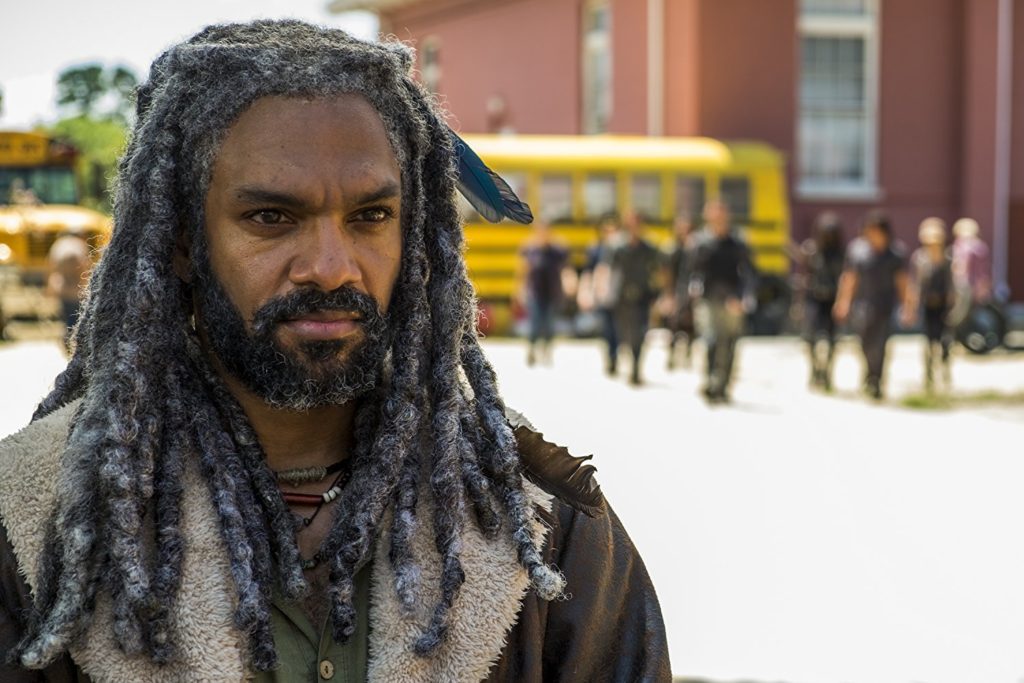
TrunkSpace: So often you hear actors talk about how they apply their on-screen experience to voice acting, but here you took what you learned at a microphone in a booth and applied it to your live action performance.
Payton: I think with all of it, one hand washes the other. The beauty of the job is that it’s always new and it’s always different. You can constantly explore. I’ve been able to play so many different characters and in so many different genres of acting, that I think it helps lend itself to making each part that I deal with a little more unique.
TrunkSpace: The introduction of Ezekiel came at a very important time within the ongoing story of “The Walking Dead” universe. With so much despair surrounding all things Negan, in a lot of ways he became humanity’s light at the end of the tunnel. For every ounce of bad in the world, there’s an ounce of good to balance it out. With that being said, is there more to Ezekiel than just a character? Does he represent something else – a sort of universal idea that there can’t be darkness without light?
Payton: Yeah. I think a lot of our job in The Kingdom was to bring some light and some hope back into a hopeless situation. But I also think that there are a lot of similarities as far as Negan and Ezekiel are concerned. They’re both very theatrical guys who are kind of about “the show.” Negan doesn’t just want to kill somebody, he wants to make a production out of it. And in that way, I think he feels he’s protecting himself. They both use theatrics to very different ends.
TrunkSpace: “The Walking Dead” fandom is far-reaching. Most of the actors aren’t too far removed physically from their on-screen persona, but there’s a bit of distance between real-world Khary and undead world Ezekiel thanks in large part to hair, makeup, and wardrobe. Does that physical separation allow you to have a bit more anonymity than perhaps some of the other actors?
Payton: Yeah, I would say I’m not as recognizable as Norman or Josh McDermitt, who plays Eugene. I mean, that mullet is hard to miss. (Laughter)
It’s getting a little harder to walk around without being noticed. The first nine months of this whole thing, I could walk down the street and not worry about it too much, but once the show’s back on, and especially after I do “The Talking Dead,” I start to realize people say hello just about everywhere I go. But it’s usually not a mob. It’s one or two people here or there and everybody’s really polite. I have to say, my life, although it has changed drastically, at the end of the day, it hasn’t changed that much. I go to work, when I get back home I take my girls to school and take out the trash – I guess it’s all a matter of perspective. But the work is really gratifying and it’s really cool to be able to go to these conventions and meet people who are really affected by the show.
TrunkSpace: And as we touched on at the start of conversation, to have been in nine episodes of a series thus far and have affected so many people in such a profound way, there’s something really special about that. That’s the reason you get into acting, right?
Payton: Absolutely! It’s the absolute reason why you get into it, or at least, it’s why I think you get into it for the right reasons. I always say, “We’re in the hope business.” People turn on their televisions or they go into a dark theater to find some entertainment, but beyond that, I think hope and inspiration. If you’re doing it right then some incredible things can happen.
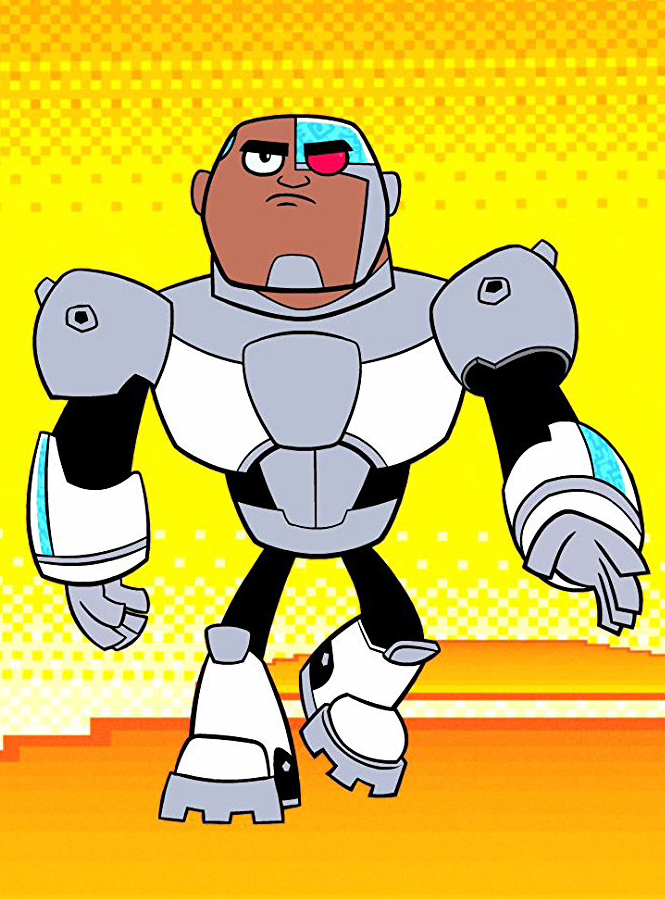
TrunkSpace: You have voiced nearly 200 episodes of Teen Titans Go!,” which is a mind boggling number of episodes in television, but especially animation. Do you think you’ll ever be as close to another character as you are Cyborg, if for no other reason, just because of the volume?
Payton: (Laughter) Well, volume-wise, maybe not, but you never know. If I play my cards right, maybe I’ll somehow dodge the walkers and the bullets. (Laughter) But that’s going to be a more difficult proposition.
Cyborg was my first voiceover job and my first voiceover audition. I feel like that character is probably closer to me just because there have been so many iterations of Cyborg since then, but the first one, they kind of tailored him to me. I know there were Cyborgs before, but he really kind of blew up in that first “Teen Titans” show in the early 2000s, and so I feel kind of like a proud papa when it comes to that character in that we were able to kind of launch him into the larger fandom of comic book characters.
TrunkSpace: Your version of Cyborg has kind of become the character for so many people, so when they read comics with the character now, they’re probably reading him in their heads as you. That’s pretty cool.
Payton: Yeah, it’s kind of cool, man! (Laughter) I kind of liken it to Scooby-Doo. When I was a kid, I felt like Scooby-Doo was always around, even though it hadn’t been around, probably even when I was born. There are kids growing up now and Cyborg has been around as long as they have been alive, which is kind of crazy. As far as they know, Cyborg has always been around. Except for a few instances, I’m pretty much the voice. Of course there’s a new Cyborg now in the “Justice League” movie, but still, I feel like we gave birth to that being a thing.
TrunkSpace: You’re also voicing the new “Big Hero 6” series, bringing life to fan-favorite character Wasabi-no-Ginger. Is it a different experience for you finding a character who existed fairly recently through another actor?
Payton: They really were open to me just kind of giving my own take and not trying to do an impression, so it felt very organic, finding Wasabi’s character. I didn’t feel like I was having to put on too much. I was just able to bring myself to it, and so that made it easier. Plus, Wasabi being such a, literally animated character, he reminds me a lot of Cyborg, so I kind of just brought a little bit of that to it.
“The Walking Dead” airs Sundays on AMC.
“Big Hero 6: The Series” premieres November 20 on Disney XD.
The 200th episode of “Teen Titans Go!” airs November 24 on Cartoon Network.


